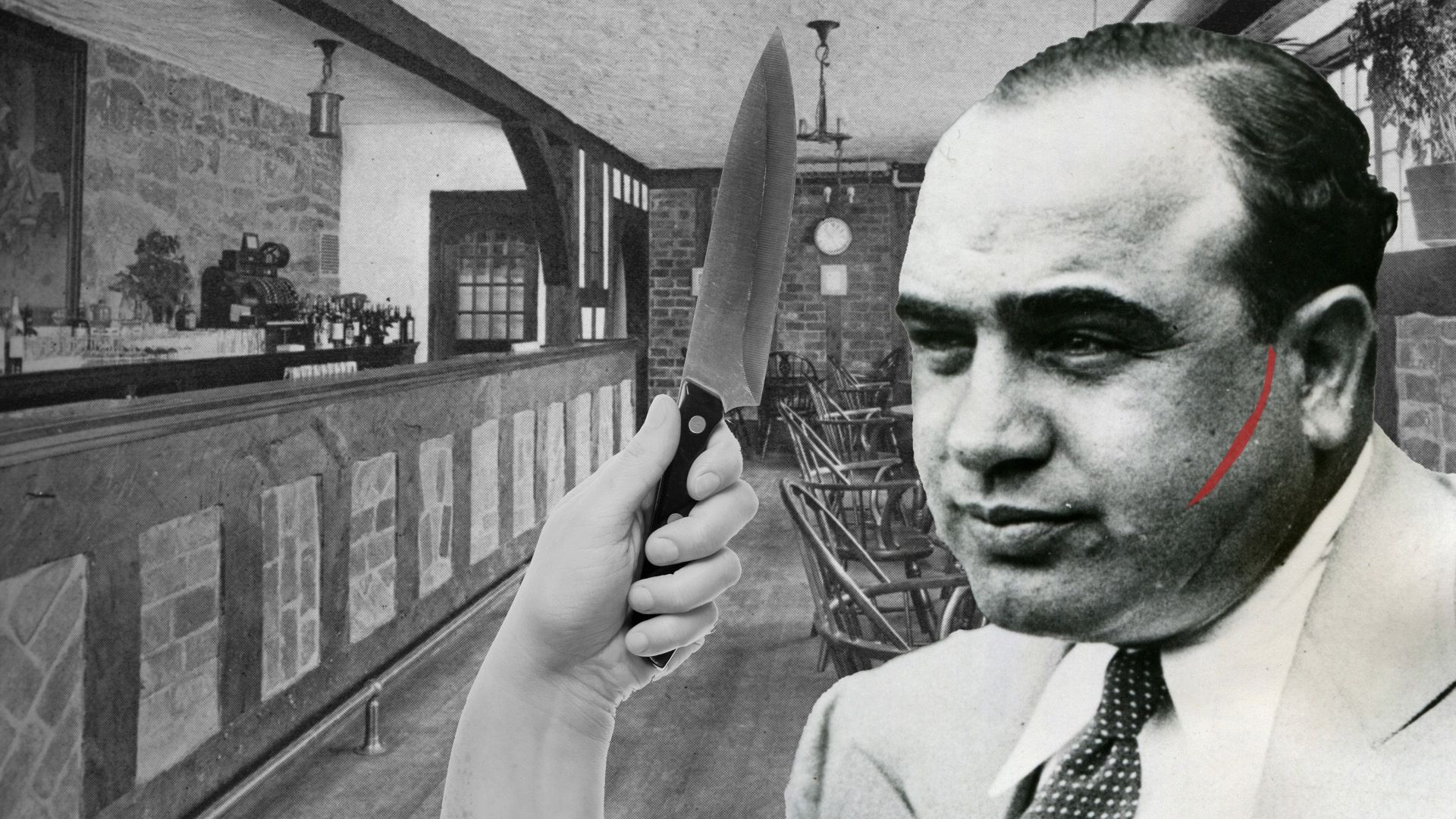The Bonanno Crime Family, a New York City-based organized crime syndicate, traces its origins back to late 19th-century Sicily. It stands as one of the notorious “Five Families” of New York City, a quintet of Mafia organizations that have significantly shaped the landscape of American organized crime. Alongside the Gambino, Genovese, Lucchese, and Colombo families, the Bonannos have maintained a powerful, albeit turbulent, presence for over a century. Unlike many other major US cities where single crime syndicates held sway, New York City became unique for hosting multiple powerful groups that divided territories – these became known as the Five Families. Remarkably, the Bonanno family is the only one to still bear its founder’s name, a testament to its enduring, if controversial, legacy within La Cosa Nostra, the nationwide alliance also known as the Mafia.
 Mobsters and Nicknames: Unveiling the Purpose Behind Mafia Aliases
Mobsters and Nicknames: Unveiling the Purpose Behind Mafia Aliases
The Purpose of Mafia Nicknames: Exploring the tradition of aliases within organized crime, like “Scarface” and “Mickey the Nose,” and their significance.
The roots of the Bonanno crime family firmly took hold in Brooklyn, New York, fueled by the influx of Sicilian immigrants who would become its founding members. Their rise to prominence is intertwined with the violent Castellammarese War of the early 1930s. This brutal conflict, named after Castellammare del Golfo, Sicily, the hometown of many involved, was a power struggle within the Mafia itself. The war pitted traditionalist Mafia factions against a younger, Americanized generation, resulting in an estimated 60 mobster deaths, many of whom held high ranks. The older generation, sometimes pejoratively called “Mustache Petes,” clung to Sicilian traditions, often resisting business dealings with non-Italians. The war ostensibly raged between the forces of Salvatore Maranzano and Giuseppe “Joe the Boss” Masseria. The assassination of Masseria in April 1931 marked the war’s end. Maranzano, in the aftermath, declared himself “boss of bosses” and strategically appointed leaders for different territories within New York, laying the groundwork for what would evolve into the Five Families.
However, Maranzano’s reign as “boss of bosses” was short-lived. Within six months, he too was murdered, a plot orchestrated by Salvatore Lucania, better known as Charles “Lucky” Luciano. Luciano, recognizing the instability of a single “boss of bosses,” proposed a more collaborative structure: The Commission. This council of crime bosses, composed of leaders from the Five Families and other major crime factions across the United States, was designed to mediate disputes, establish rules, and act as a collective governing body. Luciano’s Commission built upon Maranzano’s territorial divisions, solidifying the power of the Five Families by granting them permanent seats and influence within this new national crime syndicate.
Among Maranzano’s key appointments before his death was Joseph Bonanno, nicknamed “Joe Bananas.” A young and ambitious commander and enforcer in Maranzano’s organization, Bonanno inherited Maranzano’s family, which would eventually bear his name. His leadership spanned over three decades, a period of significant expansion and diversification for the Bonanno crime family. Under Bonanno, the family expanded its criminal enterprises into lucrative areas like loansharking, narcotics trafficking, prostitution, and illegal gambling operations. Unlike some of his contemporaries who embraced ostentation, Bonanno cultivated a less flamboyant personal style, focusing on consolidating power and expanding his family’s illicit businesses.
By 1964, at the zenith of his power, Joseph Bonanno orchestrated a daring, but ultimately disastrous, power grab. His audacious plan involved assassinating rival bosses Thomas “Tommy” Lucchese and Carlo Gambino. However, the plot backfired when Joseph Colombo, the assigned hitman (and future boss of the Colombo crime family), betrayed Bonanno, informing Gambino of the impending threat. Facing exposure and potential retaliation, Bonanno vanished. When he resurfaced in 1966, he offered a dubious explanation of being kidnapped. Law enforcement, however, suspected he had gone into hiding to evade the fallout from his failed coup and avoid testifying before a grand jury. Bonanno eventually fled to Tucson, Arizona, and in 1968, the Commission, weary of the internal strife, granted him sanctioned retirement. He lived out his days in Arizona, dying of heart failure in 2002 – a rare fate for a Mafia boss to pass away from natural causes.
Bonanno’s forced retirement plunged his family into chaos. The ensuing violent power vacuum became known as the “Banana Wars,” a grimly ironic moniker derived from Bonanno’s disliked nickname. This internal conflict resulted in as many as 13 mobster deaths as various factions vied for control. A succession of bosses rose and fell, none able to establish lasting authority, including Bonanno’s own son, Salvatore “Bill” Bonanno.
Further compounding the Bonanno family’s woes were external pressures. The introduction of the Racketeer Influenced and Corrupt Organizations (RICO) Act in 1970, coupled with relentless investigations by the Federal Bureau of Investigation (FBI), significantly weakened the family’s grip on organized crime. The infiltration of the Bonanno family by FBI agent Joseph Pistone, operating undercover as “Donnie Brasco” from 1976 onwards, proved particularly devastating. Pistone’s years-long operation, during which he ascended within the family ranks, yielded crucial evidence that led to over 100 convictions. As punishment for this unprecedented breach of security, the Bonanno family was expelled from the Commission, a symbolic but significant blow to their status. They would eventually regain their seat in the 1990s under the leadership of Joseph Massino.

Unlock Unlimited Knowledge: Explore Britannica Premium and delve deeper into subjects that fascinate you.
However, Massino’s leadership took an unexpected turn. In 2005, facing a potential death penalty trial and his eighth murder conviction, Massino made history by becoming the first boss of a New York crime family to turn government informant. He entered witness protection in 2013 and, in the interim, reportedly provided extensive information on the criminal activities of his former associates. Despite these setbacks and betrayals, the Bonanno crime family persists into the 21st century, albeit in a diminished capacity. They remain active in international drug trafficking and white-collar crimes, including loansharking and extortion. The early 2000s saw at least four Bonanno bosses convicted of serious felonies, including racketeering, murder conspiracy, and murder itself. Michael “the Nose” Mancuso held the boss’s position for much of the 2010s, navigating leadership while repeatedly incarcerated.
The Bonanno family’s tumultuous history has permeated popular culture, most notably through films like The Godfather (1972) and Donnie Brasco (1997), which offer fictionalized glimpses into their world. Joseph Bonanno himself broke the Mafia’s code of silence with his autobiography, A Man of Honor, published in 1983, becoming the first boss to openly discuss his life in organized crime. Further insights are provided in Gay Talese’s nonfiction book Honor Thy Father (1971), written in collaboration with Bill Bonanno, offering a more personal perspective on the Bonanno family saga.
